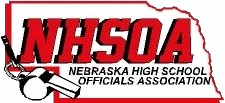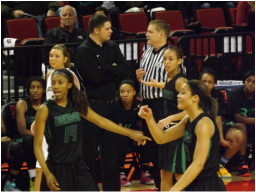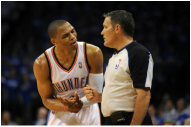Time for off season basketball. That means wearing shorts, working summer ball, and dealing with adult leagues where some of the games are downright brutal. It's also a time for complacency. Everyone complains about it. Adult players are a pain to deal with, kids don't really care about playing, table people stink, the pay is bad...the list goes on and on.
One of the biggest gripes is how it can hurt your officiating because people don't use good mechanics. I find that pretty funny. During rec leagues or summer games, there are plenty of people who Cadillac it. They loaf down the court, don't blow the whistle much, and just don't put in their best effort. They're no different than players who dog it at practice to "save it for the game".
Every time you step on a court, you need to perform. Earn your money. Earn the respect of the players and coaches.
Here are some thoughts to consider about working the long off season:
1. You can always use great mechanics. If you think your mechanics need work, by all means work on them. If nobody else is doing them, who cares? For myself, I believe I have pretty good mechanics, and to be honest, there are times when I don't exhibit full-bore reporting/rotating mechanics in mundane off season games, but I never let it bleed anywhere else in my game. You still have to communicate with everyone.
2. You need to hustle. If you cannot physically hustle, or just cannot get up emotionally to give your best physical effort, don't do the games. There is never an excuse for not hustling and earning your check. Lots of guys get lazy during the summer. Eventually, almost all of them get lazy during the regular season. Don't do it.
3. This should be #1. Work on your judgment. You can watch kids playing pickup and work on your judgment. The more reps you get, the more situations you see, the better prepared you'll be to make judgment calls. Work on never guessing. Work on passing when there is no advantage/disadvantage. If you blow the whistle a lot, work on letting more go. If you let them play, trying blowing it more. By the way, if you are not hustling and being lazy, you're not helping your judgment.
4. Try some new stuff. Take different approaches with players, especially adults. Try different lines on coaches. Try a different persona. I have found a lot of things that don't work for me during off season games, but I have learned a lot about how to deal with emotional players during adult leagues. Trying to work in other techniques and styles that you admire in others and seeing if they work in your game is a great way to continue to improve. Offseason games allow you to do that in a less formal setting, especially when integration may be a little awkward and feel funny.
5. Don't worry about your partners. If they are not taking it seriously, and are going through the motions, just focus on yourself.
There should be little difference between regular season games and off season games. Every game is important to the players, coaches, and parents. They all pay money to play, and pay you to officiate for them. Don't be the guy that tries to do everything the right way from November to March, and then becomes the lazy object of scorn that never crosses half-court, wants to avoid the bonus at all costs because it's just a summer game, and let players deck each other without penalty because they're dreaming about spending that $15 a game at Wal-Mart on the fishing pole they've been saving for.
And don't ever use anything as an excuse to not try and get better every time you put the shirt on. Someone is always watching.
One of the biggest gripes is how it can hurt your officiating because people don't use good mechanics. I find that pretty funny. During rec leagues or summer games, there are plenty of people who Cadillac it. They loaf down the court, don't blow the whistle much, and just don't put in their best effort. They're no different than players who dog it at practice to "save it for the game".
Every time you step on a court, you need to perform. Earn your money. Earn the respect of the players and coaches.
Here are some thoughts to consider about working the long off season:
1. You can always use great mechanics. If you think your mechanics need work, by all means work on them. If nobody else is doing them, who cares? For myself, I believe I have pretty good mechanics, and to be honest, there are times when I don't exhibit full-bore reporting/rotating mechanics in mundane off season games, but I never let it bleed anywhere else in my game. You still have to communicate with everyone.
2. You need to hustle. If you cannot physically hustle, or just cannot get up emotionally to give your best physical effort, don't do the games. There is never an excuse for not hustling and earning your check. Lots of guys get lazy during the summer. Eventually, almost all of them get lazy during the regular season. Don't do it.
3. This should be #1. Work on your judgment. You can watch kids playing pickup and work on your judgment. The more reps you get, the more situations you see, the better prepared you'll be to make judgment calls. Work on never guessing. Work on passing when there is no advantage/disadvantage. If you blow the whistle a lot, work on letting more go. If you let them play, trying blowing it more. By the way, if you are not hustling and being lazy, you're not helping your judgment.
4. Try some new stuff. Take different approaches with players, especially adults. Try different lines on coaches. Try a different persona. I have found a lot of things that don't work for me during off season games, but I have learned a lot about how to deal with emotional players during adult leagues. Trying to work in other techniques and styles that you admire in others and seeing if they work in your game is a great way to continue to improve. Offseason games allow you to do that in a less formal setting, especially when integration may be a little awkward and feel funny.
5. Don't worry about your partners. If they are not taking it seriously, and are going through the motions, just focus on yourself.
There should be little difference between regular season games and off season games. Every game is important to the players, coaches, and parents. They all pay money to play, and pay you to officiate for them. Don't be the guy that tries to do everything the right way from November to March, and then becomes the lazy object of scorn that never crosses half-court, wants to avoid the bonus at all costs because it's just a summer game, and let players deck each other without penalty because they're dreaming about spending that $15 a game at Wal-Mart on the fishing pole they've been saving for.
And don't ever use anything as an excuse to not try and get better every time you put the shirt on. Someone is always watching.



 RSS Feed
RSS Feed